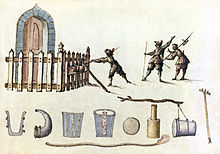petard
Jump to navigation
Jump to search
English
[edit]
Alternative forms
[edit]Etymology
[edit]From Middle French petarder; see Modern French pétard (“firecracker”).
Pronunciation
[edit]- (Received Pronunciation) IPA(key): /pɪˈtɑːd/
- (General American) IPA(key): /pɪˈtɑɹd/
Audio (Southern England): (file) - Rhymes: -ɑː(ɹ)d
Noun
[edit]petard (plural petards)
- (historical) A small, hat-shaped explosive device, used to breach a door or wall.
- c. 1599–1602 (date written), William Shakespeare, The Tragicall Historie of Hamlet, Prince of Denmarke: […] (Second Quarto), London: […] I[ames] R[oberts] for N[icholas] L[ing] […], published 1604, →OCLC, [Act III, scene iv]:
- For tis the ſport to haue the enginer / Hoiſt with his ovvne petar, an't ſhall goe hard / But I vvill delue one yeard belovve their mines, / And blovve them at the Moone: […]
- For it's amusing to have the engineer / Hoisted into the sky with his own explosive, and if I'm lucky / I will dig one yard below their mines, / And blow them towards the Moon: […]
- 1751, [Tobias] Smollett, “He is Concerned in a Dangerous Adventure with a Certain Gardener; […]”, in The Adventures of Peregrine Pickle […], volumes (please specify |volume=I to IV), London: Harrison and Co., […], →OCLC, page 49, column 1:
- [...] Pipes, who acted as the enemy's forlorn hope, advanced to the gate with great intrepidity, and clapping his foot to the door, which was none of the ſtouteſt, with the execution and diſpatch of a petard, ſplit it into a thouſand pieces.
- Anything potentially explosive, in a non-literal sense.
- (rare) A loud firecracker.
Derived terms
[edit]Translations
[edit]explosive device
firecracker
Verb
[edit]petard (third-person singular simple present petards, present participle petarding, simple past and past participle petarded)

- (now rare, archaic) To attack or blow a hole in (something) with a petard.
- 1603, Michel de Montaigne, chapter 56, in John Florio, transl., The Essayes […], book I, London: […] Val[entine] Simmes for Edward Blount […], →OCLC:
- The souldier, if he but goe to besiege a cottage, to scale a castle, to rob a church, to pettard [translating petarder] a gate, to force a religious house, or any villanous act, before he attempt it praieth to God for his assistance, though his intents and hopes be full-fraught with crueltie, murther, covetise, luxurie, sacrilege, and all iniquitie.
Translations
[edit]to attack
Anagrams
[edit]Polish
[edit]Pronunciation
[edit]Noun
[edit]petard f
Swedish
[edit]Etymology
[edit]From French pétard, used since 1600.
Noun
[edit]petard c
Declension
[edit]| Declension of petard | ||||
|---|---|---|---|---|
| Singular | Plural | |||
| Indefinite | Definite | Indefinite | Definite | |
| Nominative | petard | petarden | petarder | petarderna |
| Genitive | petards | petardens | petarders | petardernas |
Synonyms
[edit]- bomb
- firecracker
Related terms
[edit]References
[edit]Categories:
- English terms derived from Middle French
- English 2-syllable words
- English terms with IPA pronunciation
- English terms with audio links
- Rhymes:English/ɑː(ɹ)d
- Rhymes:English/ɑː(ɹ)d/2 syllables
- English lemmas
- English nouns
- English countable nouns
- English terms with historical senses
- English terms with quotations
- English terms with rare senses
- English verbs
- English terms with archaic senses
- Polish 2-syllable words
- Polish terms with IPA pronunciation
- Rhymes:Polish/ɛtart
- Rhymes:Polish/ɛtart/2 syllables
- Polish non-lemma forms
- Polish noun forms
- Swedish terms derived from French
- Swedish lemmas
- Swedish nouns
- Swedish common-gender nouns
